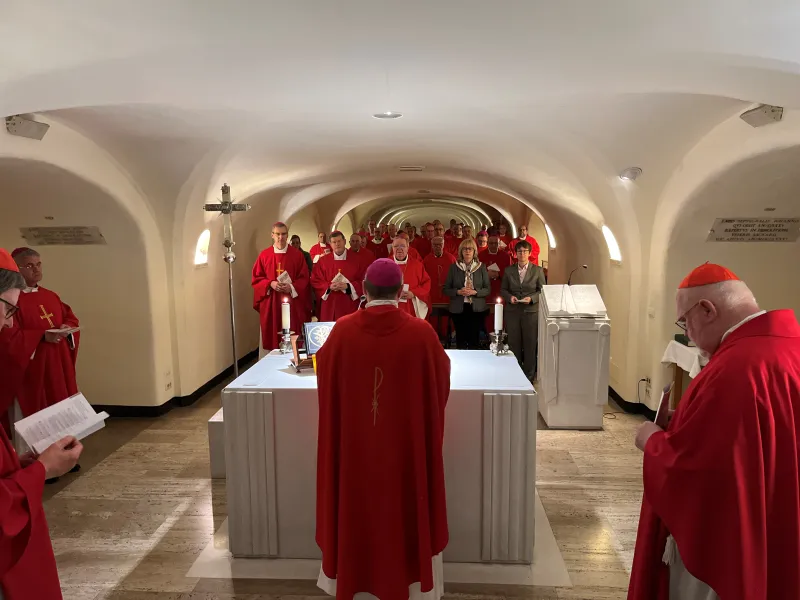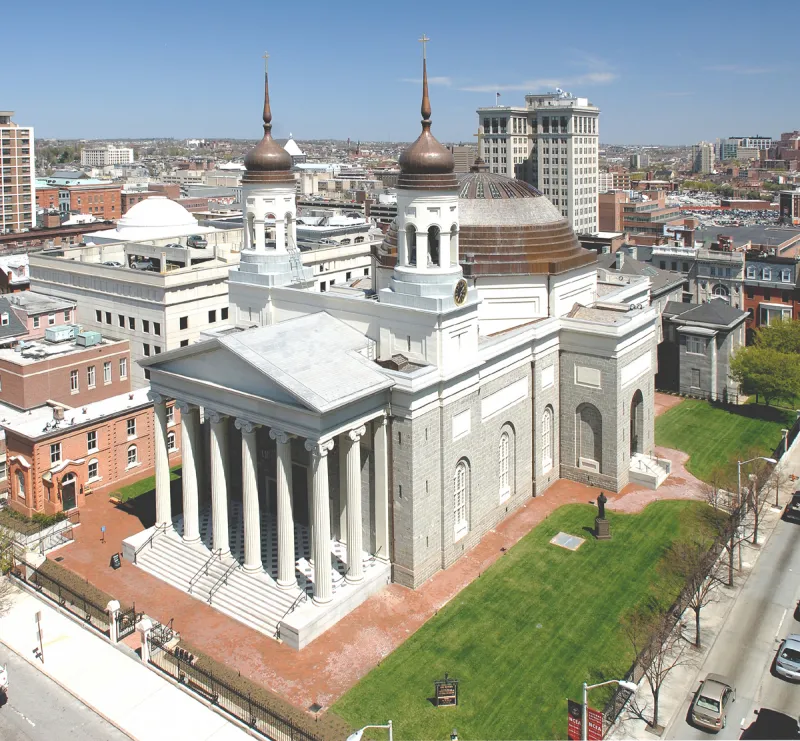 The visit of the German bishops to Rome in November 2022 began with a Holy Mass in the grottoes of St. Peter’s Basilica. / German Bishops’ Conference/Matthias Kopp
The visit of the German bishops to Rome in November 2022 began with a Holy Mass in the grottoes of St. Peter’s Basilica. / German Bishops’ Conference/Matthias Kopp
CNA Newsroom, Nov 14, 2022 / 10:30 am (CNA).
Amid ongoing concerns over the German Synodal Way, the president of the German Bishops’ Conference on Monday at the Vatican said unity and renewal in the Catholic Church was “truly not an easy task.”
Celebrating Mass at St. Peter’s Basilica on Nov. 14, Bishop Georg Bätzing of Limburg announced the German bishops would “openly and honestly address” the topics of the controversial process during their ad limina visit in Rome this week.
Every diocesan bishop in the world is required to make an “ad limina apostolorum” papal visit to provide an update on the state of one’s diocese. Sixty-three German bishops are in Rome this week for the visit, which concludes Nov. 18, according to the German Bishops’ Conference.
Bätzing said in his homily (German text) in St. Peter’s on Monday: “Preserving unity and at the same time enabling conversion and renewal — that is truly not an easy task for our Church today.”
Several German bishops were sighted in Rome over the last few weeks in an apparent effort to prepare conversations about the controversial process.
In an interview published on his diocese’s website ahead of the visit, Bätzing said he believed it was “no coincidence that we bishops are now invited to Rome.”
The German bishop said there was “a lot of lack of understanding about our process in Rome.”
“That’s why I’m very grateful that we really have a lot of time to talk about this together. This is a real opportunity.”
The Synodal Way — Synodaler Weg in German, sometimes translated as Synodal Path — is a controversial process with the declared aim of debating and passing resolutions about four topics: the way power is exercised in the Church, the priesthood, the role of women, and sexual morality.
Writing about the process, Pope Francis in 2019 warned of disunity in a letter to German Catholics.
More recently, in early November, Pope Francis spoke about making sure to “not lose the people’s sense of faith.”
It was true, he said, that “Germany has a great Protestant church. I don’t want another one that is not as good as this one. I want Catholics to be fraternally united with the Protestant church.”
Cardinal Walter Kasper, a theologian considered close to the pope, in June warned that the German process is at risk of “breaking its own neck” if it does not heed the objections raised by a growing number of bishops around the world — and concerned Catholics in Germany.
In April, more than 100 cardinals and bishops released a “fraternal open letter” warning that sweeping changes to Church teaching advocated by the process may lead to schism.
In March, an open letter from the Nordic bishops expressed alarm at the German process. In February, a strongly-worded letter from the president of Poland’s Catholic bishops’ conference raised serious questions.
Bishop Bätzing has repeatedly dismissed any and all concerns, instead expressing disappointment in Pope Francis in May.
Two months later, in July, the Vatican issued another warning of a new schism from Germany coming out of the Synodal Way.
Ahead of the visit this week, Bätzing said he would not appear primarily as the German bishops’ president in Rome but as bishop of Limburg, CNA Deutsch, CNA’s German-language news partner, reported.
“The current situation of the Church is very challenging,” the bishop said.
“It hits me personally very hard that so many people are leaving the Church. In doing so, they are casting a vote and showing me that they no longer agree with the way the Church presents itself. The reasons are certainly varied and, for the most part, justified. Nevertheless, there are reasons to stay.”
Seven years ago, Pope Francis lamented the “erosion” of the faith in Germany: At the last visit of the German bishops to Rome in 2015, Pope Francis called on them to pay greater attention to the sacraments and to diligently perform their “function as a teacher of the faith.”
“Excessive centralization, instead of helping, can complicate the life of the Church and her missionary dynamic,” the pope warned the German prelates in November 2015.
[…]







